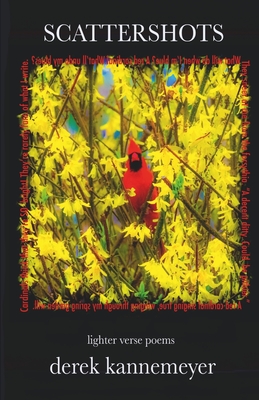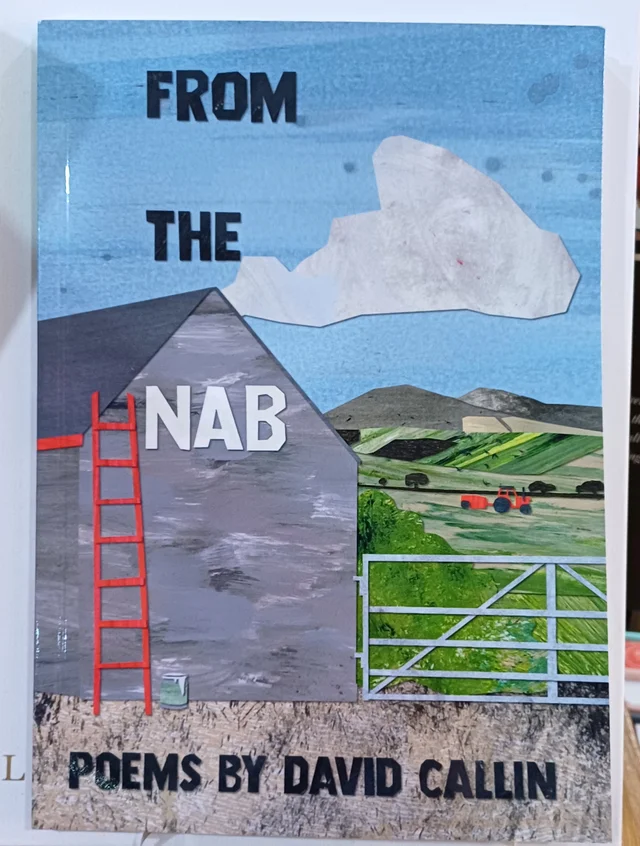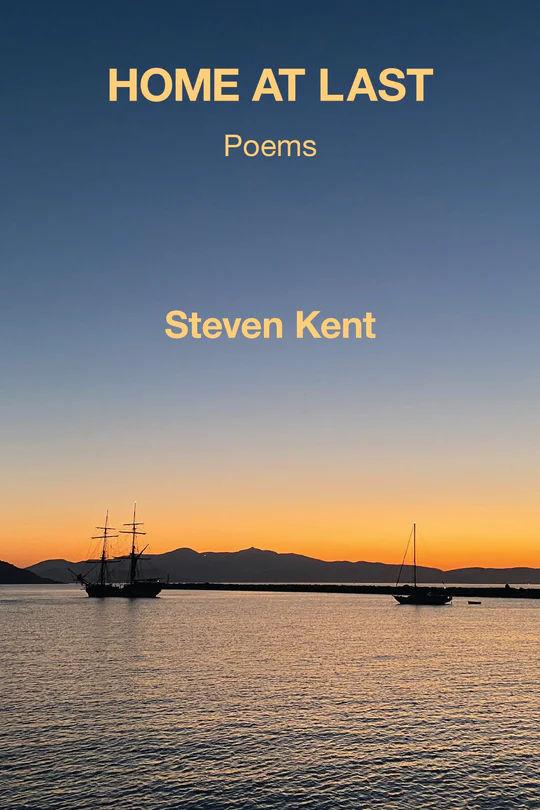If you have a book you’d like considered for a review in Light—one that includes a large helping of comic verse and was published within the previous 12 months, or will be published in the next eight—please send a copy to:
Barbara Loots
4741 Central St.
Ste. 601
Kansas City, MO 64112
(Pre-print-run electronic copies may be sent to lightpoetryreviews@gmail.com)
Light on Their Feet
Reviews of books by David Callin, Derek Kannemeyer, and Steven Kent
by Barbara Loots
Home at Last, by Steven Kent. Kelsay Books, 2025
I’m writing this on a tiny island in the middle of a small lake in Ontario. It’s pretty much off the grid. I’ve brought with me, among other reading pleasures, this new book from Steven Kent, which turns out to be great company for my contemplative time. It matches up with the kind of things I often think about: Death. Writing. Politics. You know—funny stuff. Kent addresses it all adroitly in rhyme and meter that reveal both his wit and his mastery of verse, philosophy, and life. Few poets could deliver this many poems at this peak of funny. Where to begin?
I’ve ticked fifteen poems out of more than a hundred in this collection—too many for this review, and yet not enough.
In “Of Making Books,” he writes:
Great authors will forever be
Outnumbered exponentially,
And scribes with little taste or wit
Can crank out dreck not worth a whit.
I hear ya, my friend. More “poets” than ever are flooding the planet via the internet, with scarcely a claim to decent verse (let alone poetry) in the lot. Happily, Kent rises to the call for better verse to amuse us, with form and content delightfully pulled together.
Insomniac poets (who, me?) will appreciate “Unforgettable” (soon to be reprinted in Light). Meanwhile, as the urge to see the world perhaps wanes in our later years, Kent reconciles himself to that reality:
We’ll Always Have Pittsburgh
Each day as I’m passing the airport
I’m struck by a strong urge to fly,
To jump on a plane bound for somewhere:
Duluth or Des Moines or Dubai.
A travel club called me last summer;
I wish I had chosen to join.
Who knows, maybe now I’d be seeing
Dubai or Duluth or Des Moines.
Instead I’m stuck here on this highway,
My life going nowhere, in truth,
Still dreaming one day I might visit
Des Moines or Dubai or Duluth.
And speaking of realities, in a more somber tone, Kent reminds us of “Election Day”:
They’re sweeping up the streets, and none too soon:
These flyers and the posters coming down
Could fill a bin or two. The printers’ boon
Creates a massive mess all over town.
Rash promises were made which can’t be kept,
For politics is not this way arranged.
The people voted, left, went home and slept,
Believing this time things had really changed.
For those who pull the strings, it’s purely show;
In shadows is the place true power lies.
That man behind the curtain we don’t know
Will always be in charge and in disguise.
Many of the poems I liked are too long to quote and too finely crafted to excerpt. But Kent can say a lot in three lines:
The Chair
She’d toss her clothes across a chair,
Her stuff was scattered everywhere,
And then one day she wasn’t there.
You fill in the rest of the story.
“Behind Every Cloud” sums up the spirit that animates the whole collection:
My car wouldn’t start and the bus didn’t show;
The boss blew his top ’cause he could.
No job now, no money, it’s 20 below—
Things aren’t good.
The power’s cut off, I’ve got nowhere to turn:
Old friends all say “broke—sorry, lad”
(Though out on the town they’ve got money to burn).
This is bad.
No food in my cupboard, the dog ran away,
Eviction’s begun on my flat.
But Sadie just told me she’s leaving today.
So there’s that.
So there you have six of my fifteen “favorites.” But don’t take my word for it. You’ll find this affirmative blurb on the back cover:
This book speaks directly to the human condition, though what it says is anyone’s guess.
—Reeve Ewer
My guess? You’ll enjoy it.
Scattershots: a lighter verse collection, by Derek Kannemeyer. Cyberwit.net, 2025
Considering its plethora of poems about carpet beetles, centipedes, bedbugs, cockroaches, and creepy-crawlies of other species, this generous collection of light verse is best read in brief sessions. But I guarantee ample reward. Despite occasional misses and groaners, Kannemeyer sustains remarkable wit and verse styles in short poems and long ones. He performs in limericks, epigrams, clerihews, couplets, quatrains… and so on. Included here is his poem “Corgis and Bess,” published in Light and nominated for a Pushcart. A snippet:
We are Her Majesty’s dogs at Buckingham.
We check the stables. Grooms are mucking ’em.
Kannemeyer aims to educate by providing notes on the history of forms like the limerick, blues, and ballad. He pays tribute to versifiers he admires, such as Lewis Carroll, Hilaire Belloc, Ogden Nash, Stephen Sondheim, and yes, Taylor Swift.
How fond I’m
Of Sondheim—
Whose merit lies in and beyond rhyme—
The collection presents numerous poems about animals and birds, including the inevitable cat poem, which I liked:
Cat, Cat—
You furball, you purr-doll, you captor of hats—
You noser of knickknacks, you snatcher at gnats—
You nap-catcher, lap-lounger, peeker through slats—
You nudger of shadows that shift on the mat,
as if there’s contentment in that!
(and more!)
“Teacher Worksong” will strike a familiar note for educators. Snipped lines:
With our red pens, our ungraded papers, we are gathered
to the armchairs & shared workspace of this room […]
With our silences & punctuating grunts: our pen-squeak
spattering its blood-trail woe into a slush of a margin […]
With now & then an Aha! a Someone-gets-it! nice fat A!
Then back to spider scribble & footnote screed, to laying
down the leech-law, to bleeding the error from them….
Kannemeyer demonstrates that you can capture humor even in long lines without rhyme and meter; but he works mainly in classic verse forms, freely interpreted. Here are the first few lines of “A Cow”:
A cow isn’t easy to flummox.
Do we think on our feet?
Do we sleep on our stomachs?
A cow is less easy to flummox:
she thinks with her stomachs;
she sleeps on her feet.
She ponders the cosmos and chews.
Every so often, she moos.
There’s plenty to ponder and chew in this unusually varied collection of forms and topics.
From the Nab, by David Callin. 2024
“The Nab,” explains poet David Callin, “is Nab Farm, Crosby… Here I grew up, in the 1960s, with my parents and younger sister.” You can visit what remains of the Nab next time you set foot on the Isle of Man. You may want to, after you discover its scenery and its soul in the way that only a fine poet like Callin can show you, with good humor and enduring affection.
A handful of poems in these 94 pages are rolled out with traditional verse skills and forms. In “At the agricultural show” the poet introduces a quartet of farmers with a villanelle:
Faces red from wind and rain,
squeezed in unaccustomed suits,
Corlett, Callin, Quayle, Cain,
mingle on the tented plain—
acclamations and salutes.
Faces red from wind and rain…
A sonnet takes us to “Port Erin” for a friendly jaunt:
We left from here. There was some kerfuffle
about the boat: was it coming? Had
we missed it? That would have been awful.
So we sauntered along the promenade
and back to the sunny breakwater. At last!
Here it came, chugging round the headland. Our
jaunt was back on track. It was the first
of our memorial days out in your honour
and you were with us, as we took our places
for this jolly excursion to the Calf.
The light scintillated on your face as
we pulled away from the shining crescent
of the bay. I have this photograph,
that shows you: smiling, thin, almost translucent.
Phrases like “unalien corn” pop up now and then to remind us that Callin, even with roots deep in a rural outpost, is an educated and literary fellow. So, if I had to look up apothegm and etiolated and apotheosis (just to be sure), I knew he wasn’t simply being pretentious. And by the way, in the poem quoted above, apotheosis rhymes with horses, a near rhyme that works for me (and a perfect rhyme in the UK).
Above everything else in this thoughtful memoir, I found pleasure in Callin’s gift of imagery. I’ve noted so many examples. Here are a few:
from “Standing Stones”:
Some stand apart in fields, like Socrates
considering some abstruse question,
and have stood like that for centuries,
so that we have forgotten
to wait for them to move.
from “Aspects of my mother”:
When they sit on a couch together
it is like Mount Rushmore in cardigans.
from “A young giraffe”:
Your legs are getting longer,
your feet outpace your shoes;
you sway down the street like a
young giraffe or someone
adjusting to earth’s gravity.
the whole of “Morning over Chibbanagh”:
Across a pale December sky,
as pretty as a fan,
whose colours seem to reify
a mythical Japan,
there pass two solitary birds,
a lost quotation mark
trying to find its flock of words
before the page grows dark.
a snippet from “Friday night is music night”:
Over the dollan’s deep subservient thunder
go pipes and whistles, guitars and fiddles galore,
and sometimes one of those musical chest expanders,
the love child of a piano and a bellows.
I had to look up what a dollan is (a handheld drum). Indeed, throughout the book, there are numerous words from the Manx language that the poet does not define, let alone say how to pronounce. It’s a Gaelic language after all; you can’t “explain” the pronunciation. The last native speaker of the Manx language died in 1974. Revitalization efforts are ongoing. Look it up and listen to it on Google. Meanwhile, you won’t be annoyed when you run across a word of Manx here and there in Callin’s poems about pubs, people, and memorable old places on the Isle of Man. You’ll learn quite a lot.
The collection is enriched with evocative illustrations in color by Vicky Webb.
I’m grateful to Julie Steiner for sending me this book.
Also Received
Furthermore, by Jane Blanchard. Kelsay Books, 2025.



